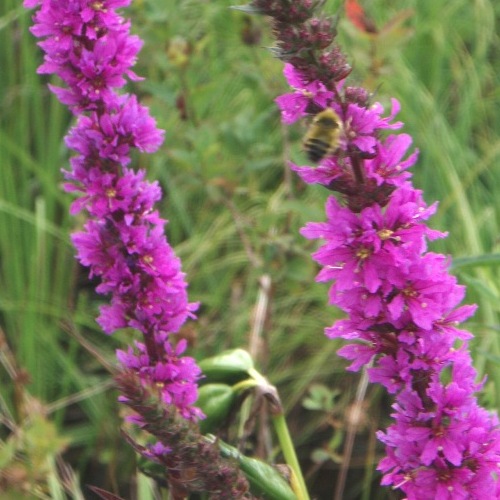Bees and Noxious Weed Control - King County Noxious Weed Control Program
King County Noxious Weed Control Board Policy
--Adopted July 15, 2015 (download the policy)
The mission of the King County Noxious Weed Control Program (KCNWCP) is “To provide benefits to the environment, recreation, public health and economic resources of King County by preventing and minimizing harmful impacts of noxious weeds”. As such, the Noxious Weed Control Program has prioritized the treatment of invasive plant species that meet the criteria of a noxious weed in accordance with RCW 17.10 and WAC 16-750.
It is important to control noxious weeds in order to protect Washington State’s environment, natural resources and agriculture. Although some noxious weeds may serve as forage for European honey bees and other pollinators, the negative effects of these invasive plant species generally far outweighs their value as a source of pollen and nectar.
The King County Noxious Weed Control Board is fully aware of the essential role native and non-native pollinators have on our environment and we are making every reasonable effort to avoid harming pollinators, while fulfilling our mission of noxious weed control.
In order to effectively remove noxious weeds, the program may selectively apply a low toxicity herbicide, which has been reviewed and approved by the King County IPM Steering Committee. These approved herbicides have been identified as being the most effective at controlling a particular noxious weed, while exhibiting the lowest risk and toxicity characteristics. KCNWCP does not use insecticides or any other product that is acutely toxic to honey bees.
The Board has heard and understands the concerns of the beekeeping community about pesticides harming pollinators, including European honey bees. In partnership with the Washington State Noxious Weed Control Board, we have adopted practices to minimize impacts to bees and other native pollinators, while continuing to fulfill our obligations in King County. Based upon the most current science and best management practices from accredited researchers and agencies, we have directed the program to implement the following protocols to minimize our contact with bees in the environment.
First, the KCNWCP will make every reasonable effort to schedule control work so that it will minimize potential interaction with bees. As such, staff members will make every reasonable effort to avoid contact with pollinators where flowering plants are located and will schedule treatments during non-flowering periods and during times when the bees will not be active.
Second, the KCNWCP is committed to working closely with landowners in project areas to re-establish desirable native and non-invasive plant species to replace the controlled noxious weeds. These non-invasive and native species offer an alternative pollen and nectar source that are not harmful, state regulated noxious weeds. These replacement species offer substantial benefits for bees and pollinators and also benefit water quality, fish and wildlife—whereas invasive noxious weeds do not.
Through the use of low toxicity herbicides and these two protocols, the KCNWCP is able to minimize potential negative impacts to bees and other pollinators. The board is also committed to continued partnership with the pollinator community, accredited research organizations and government organizations to continually monitor and review the best available science addressing this issue.
The King County Noxious Weed Control Board and Program is fully committed to fulfill our role in controlling noxious weeds in the most effective and safe method as possible, and will continually adapt our methods in alignment with the best available science.
References
Bees and noxious weed control – finding common ground, Washington State Noxious Weed Control Board
10 ways to protect bees from pesticides, Washington State Department of Agriculture
How to reduce bee poisoning from pesticides; Oregon State University, University of Idaho Washington State University

Related Information
Agencies
Program offices are located at 201 S. Jackson St., Suite 600, Seattle, WA 98104. To contact staff, see the Noxious Weed Control Program Directory, send an email, or call 206-477-WEED (206-477-9333).

 Translate
Translate